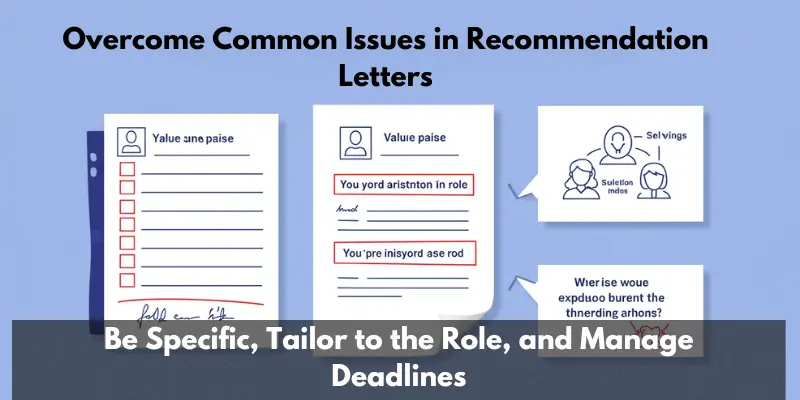What is a Recommendation Letter? Everything You Should Know
Published: 12 Feb 2025
When it comes to applying for jobs, universities, or scholarships, a recommendation letter can often be the deciding factor. But what exactly is a recommendation letter and why is it so crucial? Simply put, it’s a formal endorsement of your skills, character, and qualifications, written by someone who knows you well. It serves as a third-party validation of your abilities, adding weight to your application.
But why is a recommendation letter so important? Is it just another requirement to tick off, or can it actually make a difference? How do you ask for one? And what should a strong recommendation letter include?

In this article, we will answer these questions and cover key aspects of recommendation letters—from how to request one, to the common misconceptions that surround them. We’ll also dive into the types of recommendation letters, who typically write them, and address some common problems applicants face, along with practical solutions.
By the end, you’ll have a solid understanding of what a recommendation letter is and why it’s such an essential part of your application process. Let’s dive into the details!
What is a Recommendation Letter?
Let’s start by answering the question you’re probably wondering: What is a recommendation letter?
At its core, it’s a document where someone who knows you well—maybe a boss, a teacher, or even a mentor—writes a letter to vouch for your skills, character, and achievements. It’s like having a personal advocate speak on your behalf, and it can be a game-changer in applications for jobs, colleges, or scholarships.
But here’s the thing: a recommendation letter is not just a “Hey, this person is great!” It’s a chance to really dive into your strengths and prove that you’re not just another resume or application sitting on a pile. It’s about showing what makes you stand out and why you’re worth considering.
Why Are Recommendation Letters Important?
Now, you might be thinking, “Do I really need one?”
Well, if you want to leave a lasting impression, then yes, you do. Let’s break it down:
- They Validate Your Skills: Imagine you’re applying for a job, and your resume lists all your great skills and experiences. But what sets you apart? A recommendation letter says, “Hey, I worked with this person, and I can vouch for everything they claim.” It adds a layer of authenticity that your resume alone can’t provide.
- They Bring a Personal Touch: Unlike a dry resume or cover letter, a recommendation letter gives a personal touch. It’s a chance to show your character, your growth, and how you interact with others in real-life situations. It’s more than just numbers and facts—it’s about who you are.
- They Help You Stand Out: In highly competitive fields or universities, standing out can feel like an impossible task. But a strong recommendation letter can be that tipping point. It’s a chance to get noticed and show someone has gone the extra mile to support your application.

Who Typically Requests and Writes a Recommendation Letter?
You’re probably wondering, “Who’s the one asking for this and who’s doing the writing?”
Let’s start with the first question. Who requests a recommendation letter?
Generally speaking, it’s anyone applying for a job, college, or scholarship. If you’re aiming for a competitive position or institution, a recommendation letter is often a required part of the application process.
Now, who writes these letters?
It’s usually someone who has directly worked with you or guided you in some capacity. So, teachers, professors, supervisors, or mentors are the ones most likely to write your recommendation letter. They know your work ethic and can speak to your character in a way that a random person can’t.
Key Features of a Strong Recommendation Letter
So, you’ve got a recommendation letter on the way. But, how do you ensure it’s strong? Here’s what makes a letter truly stand out:
- Personalization: A strong letter will highlight the unique qualities that make you, well, you. It’s not about generic phrases like “she’s a great worker.” The best recommendation letters dive deep into your specific skills and experiences.
- Concrete Examples: A good recommendation letter doesn’t just say “He’s great at problem-solving.” It gives examples—like how you solved a complex issue at work, or an instance where you went above and beyond to deliver results. Those specific examples make all the difference.
- Clear Structure: You want the letter to be easy to follow. A solid recommendation letter usually starts by explaining how the writer knows you, moves into your strengths and examples and ends with a strong endorsement.
- Professional Tone: While it’s a personal letter, it still needs to have a professional tone. It should convey respect and highlight your achievements in a formal manner.
Different Types of Recommendation Letters
When it comes to recommendation letters, one of the most common questions is: What type of recommendation letter do I need? The truth is, the answer depends on the situation—whether you’re applying to college, looking for a job, or seeking a volunteer position. Each of these scenarios requires a different approach.
If you’re unsure about which type of recommendation letter suits your needs, don’t worry! I’ve already covered this topic in a previous article. It breaks down all the key types of recommendation letters and when to use each. To learn more, just hop over to my article on the different types of recommendation letters.
Common Problems and Solutions in Recommendation Letters
Sometimes, things don’t go as smoothly as we’d like with recommendation letters. Let’s address some common issues and how to fix them:
- Problem 1: Vague or Generic Praise
Solution: Ensure that the letter highlights specific examples of your achievements. Instead of saying “He’s reliable,” the writer should explain how you’ve demonstrated that reliability with real-life examples. - Problem 2: Not Tailored to the Role
Solution: The letter needs to be relevant to the role or purpose you’re applying for. A recommendation for a teaching position, for example, should highlight different qualities than one for a corporate job. - Problem 3: Tight Deadlines
Solution: Always give your recommender plenty of time. Rushed letters are often less impactful. If you’re running out of time, kindly remind them, but never pressure them.

How to Ask for a Recommendation Letter
So, how do you ask for a recommendation letter without sounding awkward? Here’s the simple breakdown:
- Give Plenty of Notice: The more time your recommender has, the better the letter will be. Ideally, you want to ask at least 3-4 weeks before the letter is due.
- Be Clear About Why You Need It: Explain why you’re asking for the letter and what you’re applying for. Are you going for a job? A scholarship? The clearer you are, the better they can tailor the letter.
- Provide Supporting Materials: Help your recommender by giving them your resume, a list of your achievements, and any relevant documents. This makes it easier for them to write a strong letter.
- Be Grateful: A little appreciation goes a long way. Always thank your recommender, whether they’ve agreed to write the letter or after it’s been submitted.
Common Misconceptions About Recommendation Letters
Some people get the wrong idea about recommendation letters. Let’s clear a few things up:
- Misconception 1: A Strong Relationship Guarantees a Good Letter
Even if you’re best friends with someone, they may not be the best choice to write your recommendation. It’s important they can speak directly to your skills and experiences. - Misconception 2: Only Teachers or Employers Can Write Recommendations
While teachers and employers are common, anyone who knows you well and can speak to your strengths can write a recommendation letter. Coaches, mentors, and even community leaders can be great choices. - Misconception 3: Longer Letters Are Better
Short and sweet works just fine if the letter is clear and focused on your achievements. Quality over quantity is what matters most.
FAQs About What is a Recommendation Letter?
When it comes to recommendation letters, there are always a few questions that pop up more often than others. Let’s clear up some of the most common queries, so you can move forward with confidence!
A recommendation letter is typically used to support someone’s application for a job, college, or any other opportunity. It provides insight into the applicant’s skills, character, and suitability for the position.
A strong recommendation letter is usually about one page long. Keep it concise but impactful, highlighting the most relevant traits and achievements of the person you’re recommending.
Ideally, a recommendation letter should come from someone who has a professional or academic connection with you. Family members can sometimes be seen as biased, so it’s better to ask a teacher, employer, or mentor.
When asking for a recommendation letter, be polite and respectful. Provide the person with enough time to write a thoughtful letter and give them details about the role or program you’re applying for.
When requesting a letter, include information about the opportunity you’re applying for, why you’re interested in it, and any specific achievements or qualities you’d like highlighted in the letter.
A strong recommendation letter will highlight your unique strengths, provide specific examples, and demonstrate why you’re an ideal candidate for the position or program.
It’s okay to reuse recommendation letters, but ideally, they should be tailored to each application. A personalized letter for each opportunity makes a stronger impression.
It’s best to ask for a recommendation letter at least 4-6 weeks before the deadline. This gives the person ample time to write a thoughtful letter without rushing.
If someone is unable or unwilling to write you a recommendation letter, don’t take it personally. Thank them politely and consider asking someone else who may be more familiar with your achievements.
Yes, a signed recommendation letter carries more weight and feels more personal. It shows that the writer is fully endorsing you and your abilities.
Conclusion:
So guys, in this article, we’ve covered what is a recommendation letter? in detail. I hope you now have a clear understanding of what it is, why it’s important, and how to make sure yours stands out. Here’s a quick recap of the key takeaways:
- What a recommendation letter is and its role in job applications, college admissions, and other opportunities.
- Why recommendation letters are crucial for making a lasting impression.
- Key elements of a strong recommendation letter, including examples and tips for both the writer and the recipient.
- How to ask for a recommendation letter in a professional and respectful way.
- Common problems and solutions that might arise during the process.
I highly recommend taking the time to carefully consider who you ask to write your letter. A well-crafted recommendation letter from someone who knows you well can truly set you apart. So, don’t rush—plan ahead and give your recommender all the details they need to help you succeed.
If this article helped you don’t keep it to yourself! Share it with friends or colleagues who might benefit from this advice. If you’re ready to get started with your own recommendation letters, explore more of our detailed guides to help you along the way. Feel free to reach out if you have any questions—we’re here to assist you!

- Be Respectful
- Stay Relevant
- Stay Positive
- True Feedback
- Encourage Discussion
- Avoid Spamming
- No Fake News
- Don't Copy-Paste
- No Personal Attacks

- Be Respectful
- Stay Relevant
- Stay Positive
- True Feedback
- Encourage Discussion
- Avoid Spamming
- No Fake News
- Don't Copy-Paste
- No Personal Attacks








